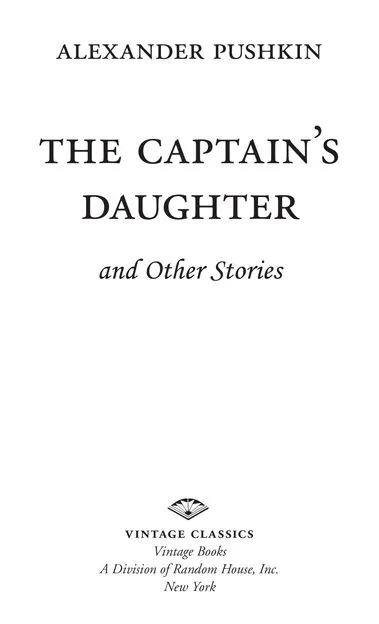B007GZKQTC EBOK
ALEXANDER PUSHKIN
THE CAPTAIN’S DAUGHTER
and Other Stories
Alexander Pushkin (1799–1837) was a writer, poet, and playwright of the Romantic era who pioneered the use of vernacular speech in Russian literature. He was descended from Russian nobility and from an African great-grandfather who had been raised at the court of Peter the Great. Pushkin’s commitment to social reform led him to suffer a period of exile and government censorship, during which he wrote some of his most famous works. He died after fighting a duel at the age of thirty-seven.

FIRST VINTAGE CLASSICS EDITION, AUGUST 2012
Compilation copyright © 1957 by Random House, Inc.
All rights reserved. Published in the United States by Vintage Books, a division of Random House, Inc., New York, and in Canada by Random House of Canada Limited, Toronto. This edition was originally published in paperback in the United States by Vintage Books, a division of Random House, Inc., New York, in 1957.
“The Captain’s Daughter” was translated by Natalie Duddington. The other stories in this volume were translated by T. Keane.
Vintage is a registered trademark and Vintage Classics and colophon are trademarks of Random House, Inc.
This is a work of fiction. Names, characters, places, and incidents either are the product of the author’s imagination or are used fictitiously. Any resemblance to actual persons, living or dead, events, or locales is entirely coincidental.
eISBN: 978-0-307-94966-0
Cover design by Megan Wilson
Front cover art: Cossack of the Don, 1880s, Russian School / Private Collection / Peter Newark Military Pictures / The Bridgeman Art Library
www.vintagebooks.com
v3.1
Contents
Cover
About the Author
Title Page
Copyright
THE CAPTAIN’S DAUGHTER
THE TALES OF BELKIN
THE SHOT
THE SNOWSTORM
THE UNDERTAKER
THE POSTMASTER
MISTRESS INTO MAID
THE QUEEN OF SPADES
KIRDJALI
THE NEGRO OF PETER THE GREAT
The Captain’s Daughter
Watch over your honor while you are young …
A PROVERB
I
A SERGEANT OF THE GUARDS
He would have been a Captain in the Guards tomorrow.
“I do not care for that; a common soldier let him be.”
A splendid thing to say! He’ll have much sorrow …

Who is his father, then?
KNYAZHNIN
My father, Andrey Petrovich Grinyov, had in his youth served under Count Münnich and retired with the rank of first major in the year 17—. From that time onward he lived on his estate in the province of Simbirsk, where he married Avdotya Vassilyevna U., daughter of a poor landowner of the district. There had been nine of us. All my brothers and sisters died in infancy. Through the kindness of Prince B., our near relative, who was a major of the Guards, I was registered as sergeant in the Semyonovsky regiment. I was supposed to be on leave until I had completed my studies. Our bringing-up in those days was very different from what it is now. At the age of five I was entrusted to the groom Savelyich, who was assigned to look after me, as a reward for the sobriety of his behavior. Under his supervision I had learned, by the age of twelve, to read and write Russian, and could judge very soundly the points of a borzoi dog. At that time my father hired for me a Frenchman, Monsieur Beaupré, who was fetched from Moscow together with a year’s supply of wine and olive oil. Savelyich very much disliked his coming.
“The child, thank heaven, has his face washed and his hair combed, and his food given him,” he grumbled to himself. “Much good it is to spend money on the Frenchman, as though the master hadn’t enough servants of his own on the estate!”
In his native land Beaupré had been a hairdresser; afterward he was a soldier in Prussia, and then came to Russia pour être outchitel,* without clearly understanding the meaning of that word. He was a good fellow, but extremely thoughtless and flighty. His chief weakness was his passion for the fair sex; his attentions were often rewarded by blows, which made him groan for hours. Besides, “he was not an enemy of the bottle,” as he put it; that is, he liked to take a drop too much. But since wine was only served in our house at dinner, and then only one glass to each person, and the tutor was generally passed over, my Beaupré soon grew accustomed to the Russian homemade brandy and, indeed, came to prefer it to the wines of his own country as being far better for the digestion. We made friends at once, and although he was supposed by the agreement to teach me “French, German, and all subjects,” he preferred to pick up some Russian from me and, after that, we each followed our own pursuits. We got on together capitally. I wished for no other mentor. But fate soon parted us, and this was how it happened.
The laundress, Palashka, a stout pock-marked girl, and the dairymaid, one-eyed Akulka, had agreed to throw themselves together at my mother’s feet, confessing their culpable weakness and tearfully complaining of the mossoo who had seduced their innocence. My mother did not like to trifle with such things and complained to my father.
1 comment